
Had it not been for an unfortunate rollerskating accident that left Kelly Hoppenjans with a broken arm, her latest album, OK, I Feel Better Now, may have been a different record when all was said and done.
“I discovered that my health – physical, mental, and emotional – is crucial to my ability to make music, and that my goal isn’t to hit these deadlines I set for myself, but to reach people with my music, make them feel something,” she said in an exclusive interview with TrunkSpace.
That connection she was hoping to build with audiences is apparent upon first listen to OK, I Feel Better Now, which was released on October 18.
We recently sat down with Hoppenjans to discuss owning who she is, exposing her negative self-talk, and why the Nashville scene continues to influence her songwriting.
TrunkSpace: Your debut album, OK, I Feel Better Now, is officially out into the world. Does being able to say “I have an album…” check off one of your creative bucket list items? Is this the dream or is it part of the dream?
Hoppenjans: It’s a big bucket list item! I’ve released a few singles and two EPs prior to this, but creating a full length album that was a cohesive work has been a major goal of mine. It’s the dream, but it’s only the beginning!
TrunkSpace: There’s a great genre blend on the album, and really, today it seems like musical labels are as meaningless as ever. That being said, when someone you meet asks, “What kind of music do you write?” what do you say? What is your definition of who Kelly Hoppenjans is as an artist?
Hoppenjans: I’d say, in terms of genre, that my music is a blend of riot grrrl rock and introspective singer-songwriter. But I agree that labels don’t mean a lot to me as an artist – I strive to make my music empowering, raw, innovative and true to me. Whatever that ends up being, that’s my genre.
TrunkSpace: What could someone learn about you as both an artist and a person in sitting down to listen to OK, I Feel Better Now, front to back?
Hoppenjans: They could learn that I’ve been on quite the journey to come into my own, as both an artist and a person! It’s taken me a long time fully own who I am, be comfortable with raising my voice and taking up space, and these songs were written at various stages through that journey.
TrunkSpace: Could this album have existed, say, even five years ago, or is the you represented on the 10 tracks an ever-changing Kelly who would not have been present in herself – creatively and personally – five years ago?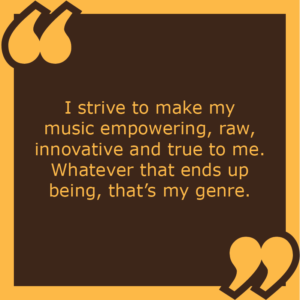
Hoppenjans: This album couldn’t have existed even two years ago! I’ve always been a type A, perfectionist, goal-oriented person who puts a lot of pressure on herself – I had a timeline for this album and how I wanted it to unfold. And then I broke my arm rollerskating and had to push everything back, and through that I had this perspective shift. I discovered that my health – physical, mental, and emotional – is crucial to my ability to make music, and that my goal isn’t to hit these deadlines I set for myself, but to reach people with my music, make them feel something. As long as I’m doing that, there’s no need to put pressure on myself to stick to deadlines I’ve set myself.
TrunkSpace: In writing the songs for the album, did you pull any punches when it came to how much of yourself you put into them from storytelling standpoint? Did anything in the lyrics leave you feeling exposed and wondering how an audience would interpret what you were trying to say?
Hoppenjans: “Band-Aid Girl” is the song that I felt most vulnerable sharing, because it’s a window into some of my most negative self-talk. I always assume things that happen in my life are my fault, even when they’re definitely not, and berate myself in my head for making those “mistakes.” So every time I sing the line, “and if you burn me, it’s a little bit my fault for thinking I could touch a glowing ember” I’m right back in that space where I’m feeling that shame, and I’ve always wondered how audiences feel about that line.
TrunkSpace: What are you most proud of with the album?
Hoppenjans: I’m easily the most proud of “Band-Aid Girl.” It’s the song where I feel the most immediate connection with audiences when I sing it, where I know I’m tapping in to something universal. It’s likely because of the vulnerability I was talking about earlier, and I’m gearing my songwriting towards accepting no less than that level of vulnerability.
TrunkSpace: Where are you hardest on yourself as an artist and did that manifest during the creation and recording of this album?
Hoppenjans: I think I struggle most with how to represent empowerment when I don’t always feel powerful. I knew I wanted to write songs that make people feel seen and encourage them to be their best, confident, powerful selves, but empowerment is more than just kick-ass anthems. It’s a complex, daily effort, and I resisted the nuance and the vulnerability of it at first. Finding strength in that has been really revelatory to me.
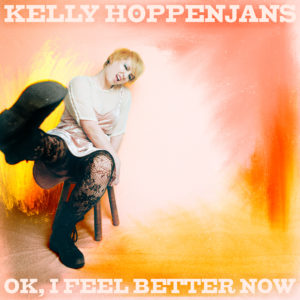 TrunkSpace: You’re based in Nashville. Does the creative energy in that city inspire you to be a better artist? With so many songwriters around you at any given time, does it force you to continuously up your game?
TrunkSpace: You’re based in Nashville. Does the creative energy in that city inspire you to be a better artist? With so many songwriters around you at any given time, does it force you to continuously up your game?
Hoppenjans: How could it not! I’m so inspired by the artists around me. I don’t necessarily think of it as upping my game, and I’m loath to compare myself to other artists, tempting as it is. The way I see it, no one else can tell my story as well as I can, and when I see other artists telling their own stories well, I soak it up and learn from it, and I’m inspired to tell my own story in a new, different way.
TrunkSpace: If you sat down with your 10-year-old self and gave her a glimpse of her future, would she be surprised by where her musical journey has taken her thus far?
Hoppenjans: My 10-year-old self had just gotten her first guitar for Christmas and was attempting to teach herself “Twinkle Twinkle Little Star,” so I’d say she’d be pretty shocked! If I could go back, I’d tell her to listen to some Hole, Bikini Kill, and PJ Harvey, and to stop caring whether other people had even heard of their music or not.
TrunkSpace: Time machine question. If you could jump ahead 10 years and get a glimpse of what your career looks like a decade from now, would you take that journey? If not, why?
Hoppenjans: Ooh, that’s tough. Not to get too sci-fi, but couldn’t I potentially mess with my own future by knowing what happens, like in Back to the Future II? How horrible would it be to know what your future could have been and miss out on it because you knew it was going to happen! I’ll stick with not knowing.
OK, I Feel Better Now is available now.



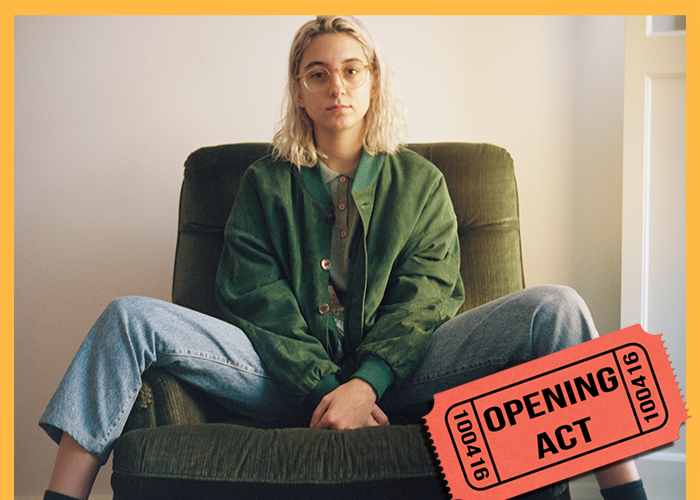

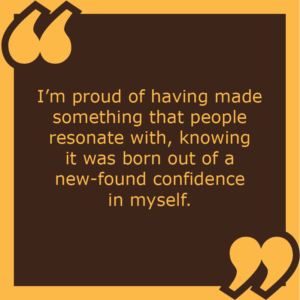
 TrunkSpace: Born in Portugal, we read that you were raised on American cartoons and films, which impacted your views on a great many things, but did that exposure to States-based pop culture directly impact your future art?
TrunkSpace: Born in Portugal, we read that you were raised on American cartoons and films, which impacted your views on a great many things, but did that exposure to States-based pop culture directly impact your future art?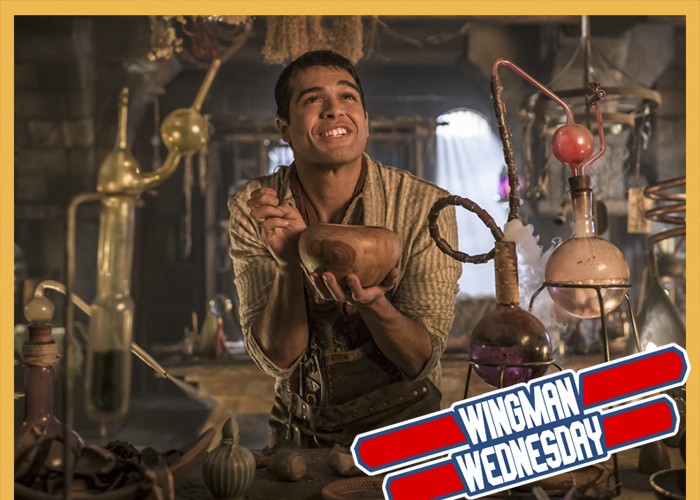

 throughout the course of Season 2?
throughout the course of Season 2?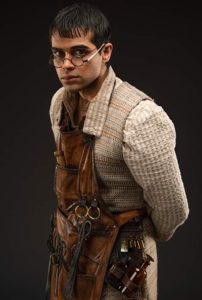 TrunkSpace
TrunkSpace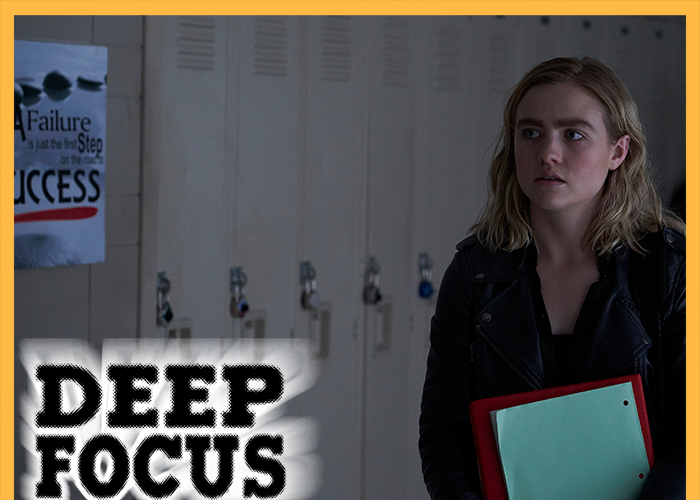
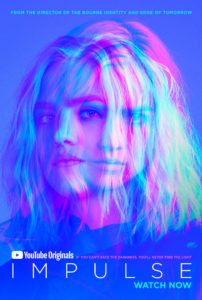 In our ongoing column Deep Focus, TrunkSpace is going behind the camera to talk with the directors, writers and producers who infuse our world with that perennial pop culture goodness that we can’t get enough of.
In our ongoing column Deep Focus, TrunkSpace is going behind the camera to talk with the directors, writers and producers who infuse our world with that perennial pop culture goodness that we can’t get enough of.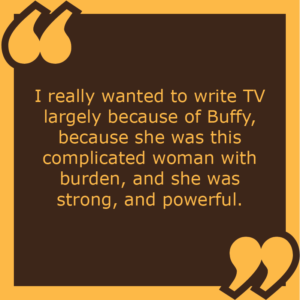 watching it on a bigger screen, truthfully. Because, I think, we try to be a very cinematic show. That doesn’t mean that I’m not aware that some people are going to watch it on their iPads or their phones, but the goal is not to cater to that particularly, but to maybe inspire people to want to see it on a bigger screen and to try to get more out of it. Especially, because we have a lot of visual effects, and our directors are so excellent. You really want to offer that on a bigger screen if you can. I’m aware of the different options people have – the lack of attention span sometimes people have. I don’t creatively think on that level in terms of how we break story and the stories that we come up with, but I’m very aware of it.
watching it on a bigger screen, truthfully. Because, I think, we try to be a very cinematic show. That doesn’t mean that I’m not aware that some people are going to watch it on their iPads or their phones, but the goal is not to cater to that particularly, but to maybe inspire people to want to see it on a bigger screen and to try to get more out of it. Especially, because we have a lot of visual effects, and our directors are so excellent. You really want to offer that on a bigger screen if you can. I’m aware of the different options people have – the lack of attention span sometimes people have. I don’t creatively think on that level in terms of how we break story and the stories that we come up with, but I’m very aware of it.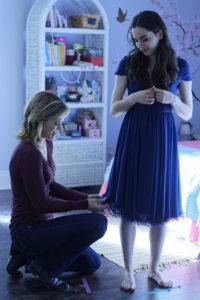
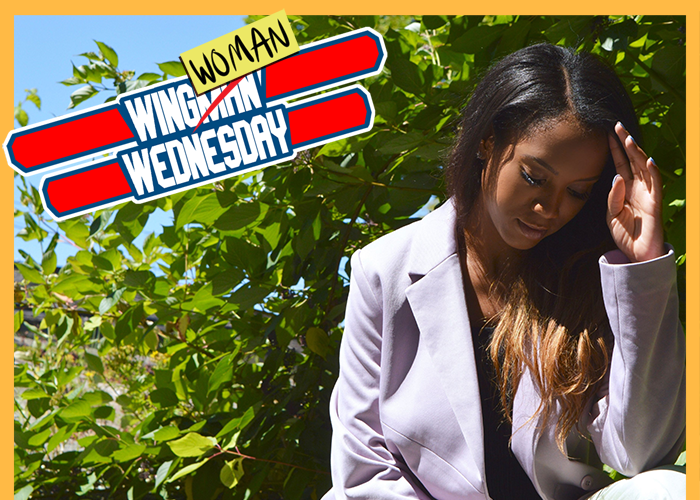

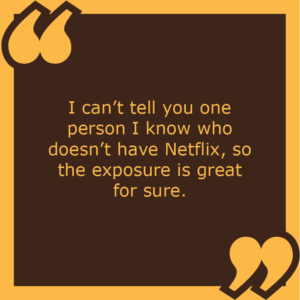
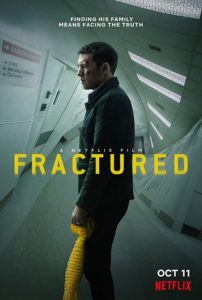 TrunkSpace: If someone came to you tomorrow and said, “Natalie, here is a blank check, go greenlight whatever you want for yourself to star in.” What kind of project would you put into development?
TrunkSpace: If someone came to you tomorrow and said, “Natalie, here is a blank check, go greenlight whatever you want for yourself to star in.” What kind of project would you put into development?

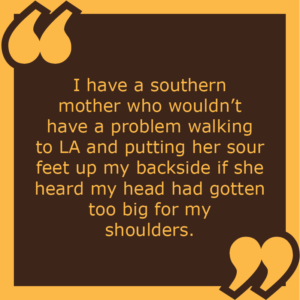 it week-after-week in a world now dominated by streaming? What is the secret sauce that the show has?
it week-after-week in a world now dominated by streaming? What is the secret sauce that the show has?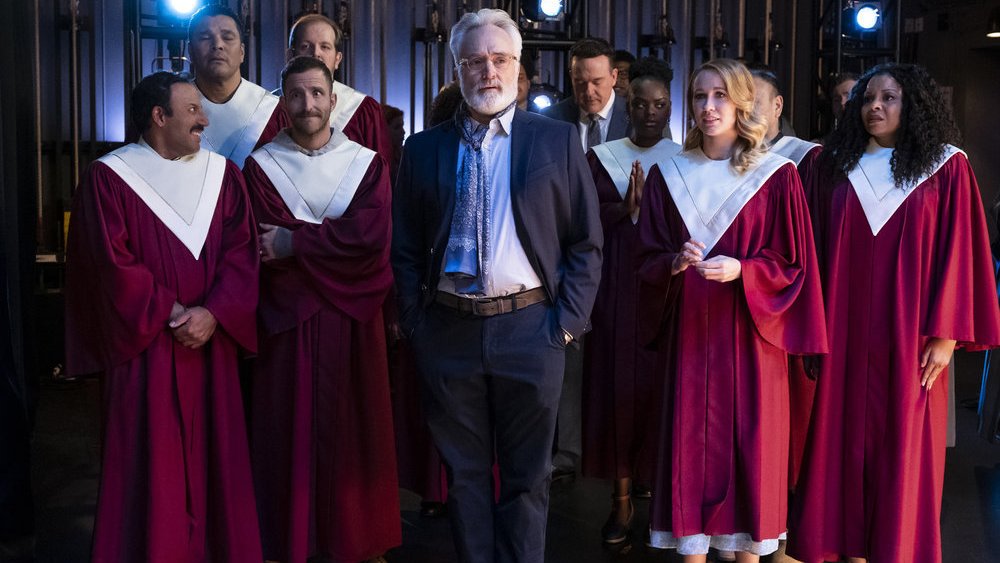
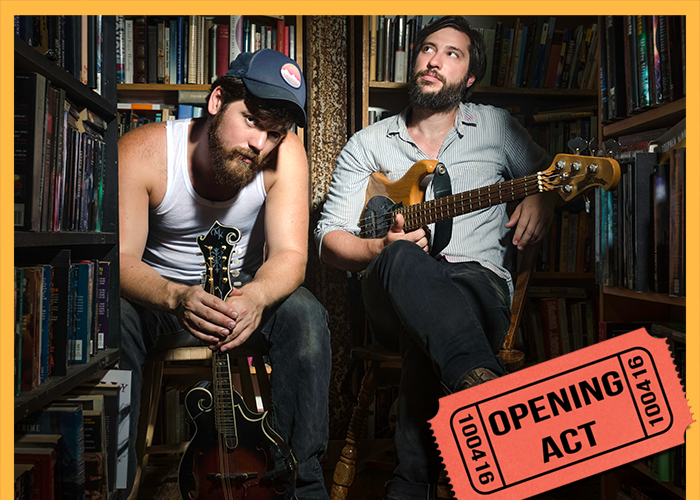
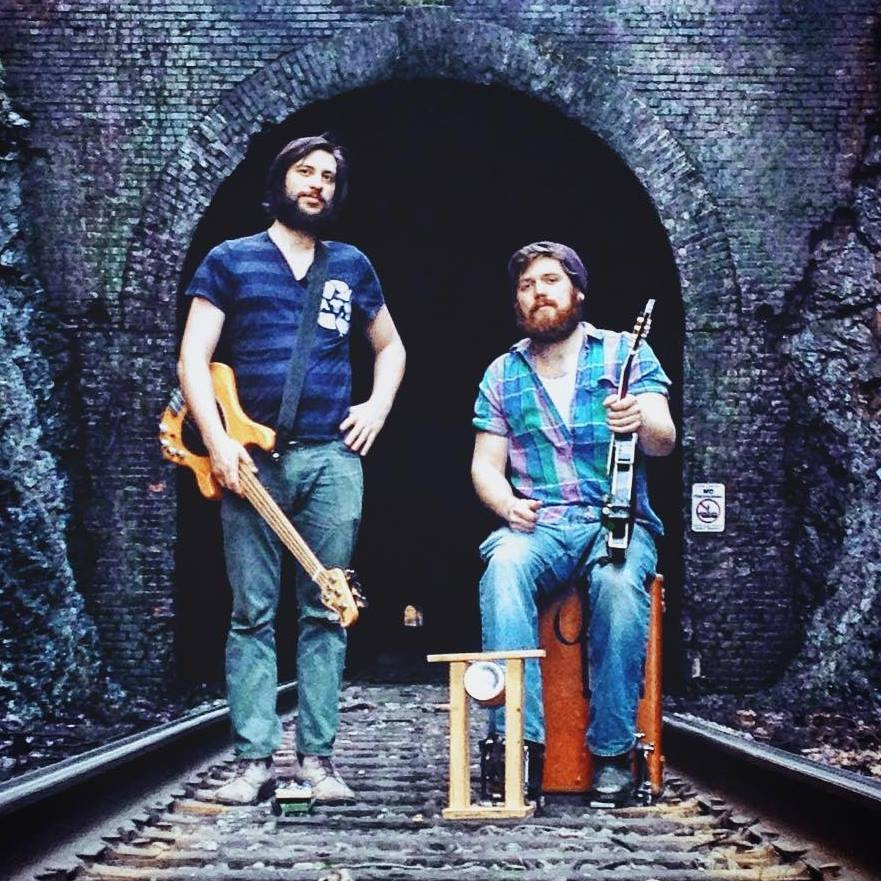 Artist: Driftwood Soldier
Artist: Driftwood Soldier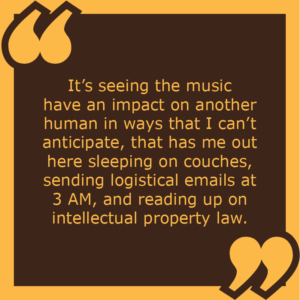
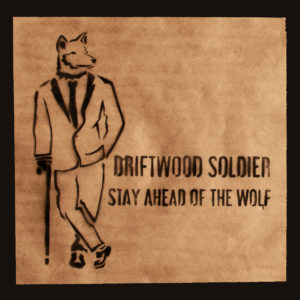 We’ve always been a DIY band, which means we do most aspects of this ourselves, down to spray-painting thrift store T-shirts with the stencils I draw to sell at the merch table. So many of the jobs I’ve had to learn and do for this project have nothing to do with why I play music. In fact, many of them are jobs I wouldn’t take a good salary to do professionally if it were offered to me. It’s performing for people that makes it worth it in the end. It’s seeing the music have an impact on another human in ways that I can’t anticipate, that has me out here sleeping on couches, sending logistical emails at 3 AM, and reading up on intellectual property law.
We’ve always been a DIY band, which means we do most aspects of this ourselves, down to spray-painting thrift store T-shirts with the stencils I draw to sell at the merch table. So many of the jobs I’ve had to learn and do for this project have nothing to do with why I play music. In fact, many of them are jobs I wouldn’t take a good salary to do professionally if it were offered to me. It’s performing for people that makes it worth it in the end. It’s seeing the music have an impact on another human in ways that I can’t anticipate, that has me out here sleeping on couches, sending logistical emails at 3 AM, and reading up on intellectual property law. 

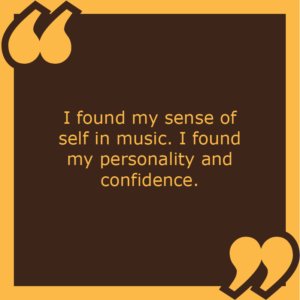 beginnings. I feel that even on some of the more melancholy songs, there is this sense of empowerment and change.
beginnings. I feel that even on some of the more melancholy songs, there is this sense of empowerment and change.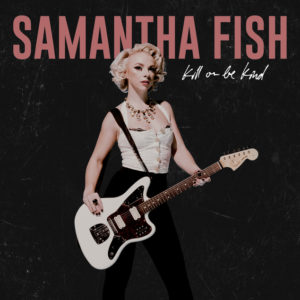 TrunkSpace: Where are you hardest on yourself as an artist, and, have you gotten less self-critical over your work as you have gotten deeper into your career?
TrunkSpace: Where are you hardest on yourself as an artist, and, have you gotten less self-critical over your work as you have gotten deeper into your career?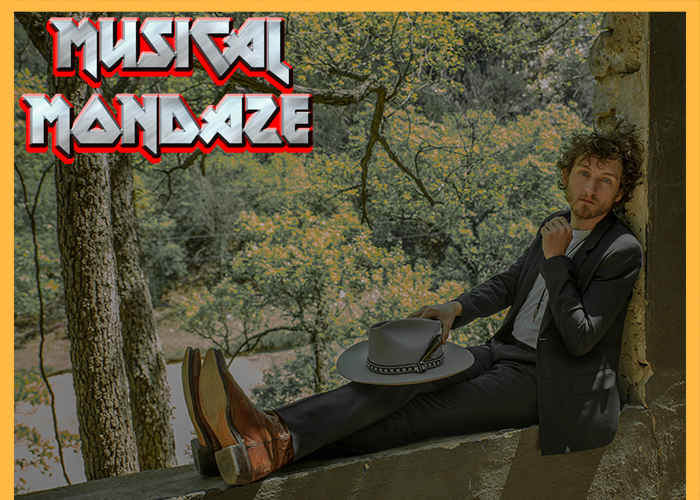
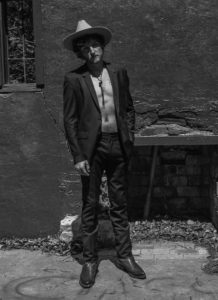
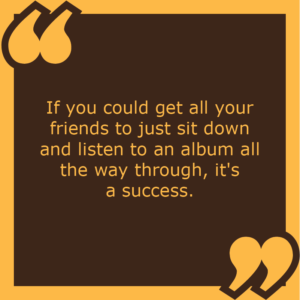
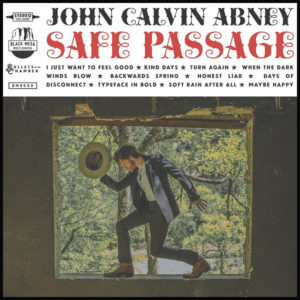 It’s a journey, man. If you could get all your friends to just sit down and listen to an album all the way through, it’s a success. If you can get a group of people to sit down, and have a beverage or without talking, or you’re just being able to comment on any record. “Blood On The Tracks” is one of my favorite records of all time, and I can listen to that record front to back every single day on my life, because it really is front to back. It encapsulates that part of Dylan’s life. All the classics. “Harvest” by Neil Young. I mean, that is front to back! You’re like, “Fuck, man!” Those are all records that you really can just get through. I really especially like that new The War on Drugs record, “Deeper Understanding.” That record… Oh my God! It’s like you get all the good feelings of Dylan and all of the while, beautiful sounds and crazy explorative stuff, but at the core of it all, it’s this emotion that carries through that entire record, and you can listen to it front to back, and by the end of it, it’s one single unit. It could be 30 songs, but it’s one single thing.
It’s a journey, man. If you could get all your friends to just sit down and listen to an album all the way through, it’s a success. If you can get a group of people to sit down, and have a beverage or without talking, or you’re just being able to comment on any record. “Blood On The Tracks” is one of my favorite records of all time, and I can listen to that record front to back every single day on my life, because it really is front to back. It encapsulates that part of Dylan’s life. All the classics. “Harvest” by Neil Young. I mean, that is front to back! You’re like, “Fuck, man!” Those are all records that you really can just get through. I really especially like that new The War on Drugs record, “Deeper Understanding.” That record… Oh my God! It’s like you get all the good feelings of Dylan and all of the while, beautiful sounds and crazy explorative stuff, but at the core of it all, it’s this emotion that carries through that entire record, and you can listen to it front to back, and by the end of it, it’s one single unit. It could be 30 songs, but it’s one single thing.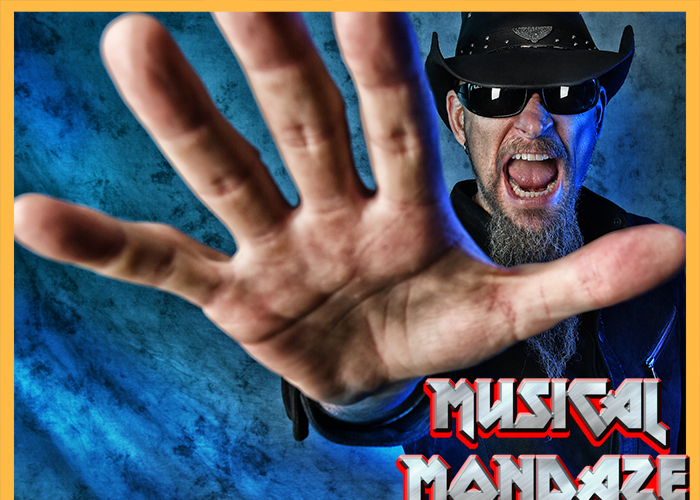
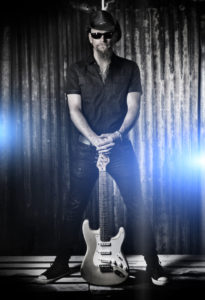 A
A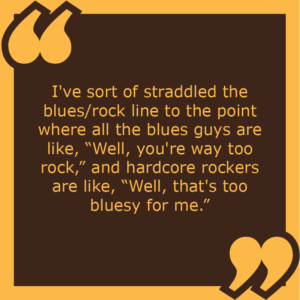 there would be two or three bands
there would be two or three bands 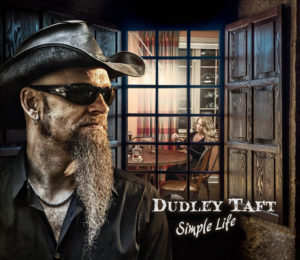 TrunkSpace
TrunkSpace